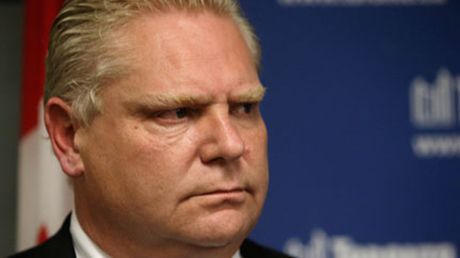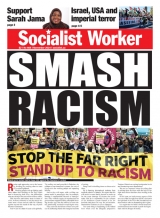Features
You are here
Doug Ford the drug dealer: breathing life into the mythologies of race, class and crime

March 27, 2018
I oppose the politics of Doug Ford. I oppose his hostility to a $15 minimum wage, the sex-ed curriculum, and the autonomy of teenage abortion. And yet, I equally oppose the "drug dealer" discourse employed by some on the left since the PC leadership convention.
The history of drug policy and criminal prosecution is marred by colonialism, racism and contempt for the poor. Along with "guns and gangs," the discourse of drug dealers has been a pretense to harass and incarcerate the poor and the racialized for decades.
Drug mythologies have been propped up to justify the targeted exclusion of communities both within and beyond Canada’s borders. Alcohol addiction is used to undermine Indigenous peoples and deflect attention from the Canadian state’s settler-colonialism. In the early 20th century, the opium trade was carefully used to portray the Chinese community as a threat to white people. South of the border, J. Edgar Hoover propagated marijuana laws to preempt the deportation of Mexicans once used as cheap labor to build the American railway. In the 1980’s, the US “war on drugs” justified the racist policing and mass incarceration of young black males.
We borrow the drug dealer trope from a collective imagination fueled by racist narratives about the proper place of whiteness and, in contrast, the criminality of the poor and racialized. After all, Ford is a failed white in the eyes of a society organized around class and race. He has betrayed his wealth and his race through his involvement with drug dealing and drug use—something only reserved for the poor, the black, the brown, and the yellow in the inner cities of this country. The mainstream loathe him for this reason. We, on the left, evoke the same logic when we attack Ford’s drug dealing past.
We also betray our compassion as people committed to a better world for the most vulnerable. Drug abuse is marred by a lifetime of trauma and unbelievable emotional suffering. In the Realm of Hungry Ghosts, Dr. Gabor Mate writes, "... it takes a greater effort of emotional imagination to empathize with the addict. We readily feel for a suffering child, but cannot see the child in the adult who, his soul fragmented and isolated, hustles for survival a few blocks away from where we shop or work." In disparaging Ford, we breathe life into a script that strips humanity from those plagued by addiction.
The categories of user and dealer are contingent upon power. Dr. Mate serves street involved addicts in Vancouver’s Downtown Eastside. He observes, “Many addicts who deal in drugs do so exclusively to finance their habit. There is no profit in it for them.” In contrast, former police officers are running towards the multi-million dollar pot industry. Leading the pack is Julian Fantino, former Toronto police chief and Conservative cabinet minister, with his company Aleafia. The same Fantino once compared marijuana to murder and supported mandatory jail time for minor marijuana offences. White shop owners will cash in while countless others are shut out by drug laws with a disproportionate impact on the racialized poor.
Make no mistake about it: Doug Ford’s ascension to the top of a major party reveals elite racial and class power. We should critique Ford’s propensity to privatize the profit from the legalization of marijuana. We are justified in critiquing the hypocrisy of structural violence that destroys too many lives through criminal prosecution.
We must organize ourselves in the coming months. We must confront the attack on workers’ rights and a woman's right to choose. We must prepare to struggle against cuts to public services like social assistance and legal aid. But in challenging that power, we must resist the temptation to look for “quick fixes” which unintentionally harm the very people we fight for. There's enough on the policy front to fight—and fight we must. Let's not validate the logic of the brutal systems we must oppose.
Section:










